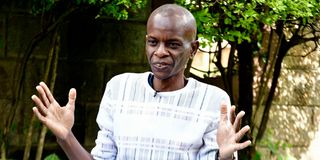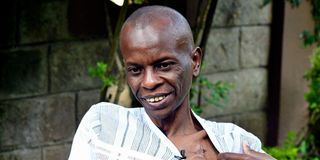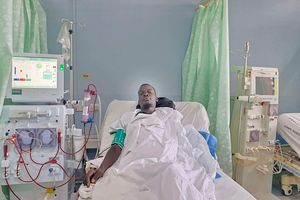My battle with rare inherited kidney disorder that has no cure

Jack Maina during the interview at his home on March 11, 2025. His kidneys produce low electrolytes, thus affecting not only his heart rate but his health.
What you need to know:
- One time I could have infections, or feel weak, but I keep getting surprises. I can’t predict what my day looks like. Every new day comes with its surprises.
“A cat has nine lives, but I believe that I have more. While I can’t remember the exact date that I started feeling sick, I have struggled with fatigue for a long time. I thought it was just that, a feeling of weariness and not really a symptom to a disease. In 2020, just before Covid-19 was declared a global pandemic, I remember complaining about palpitations. I felt as though I was gasping for air, so I sought medical help.

Jack Maina shows his pacemaker, which regulates his heart rate.
After a series of tests, the doctor advised that I needed to have an electronic device that could monitor my heart rate and rhythm. It is called a pacemaker.
After that hospital visit, my symptoms worsened. I always had a nauseous feeling. I vomited a lot. No one could figure out what it was.
I have seen all the gastroenterologists who have been ranked in the A-list in this city. I have taken all kinds of medicines, including the H-Pylori kit.
I used to weigh about 108 kilogrammes, but I lost half of that weight in four years. I now weigh 49 kilogrammes. Still, my condition remained a mystery puzzle that even the wittiest failed to deconstruct.
I longed for a day that my discharge sheet would have an answer but every time I left the hospital corridors, I got suspicions - not an actual diagnosis. The only diagnosis that was spot on was Covid-19. I got it at the same time as my mother-in-law, who unfortunately died and left me in hospital. It was one of the darkest times in my life.
I have done all the scans that are there to be done. The hospital corridors know me by name.
My employer noticed the back and forth that I had tried to get an answer, so they put me up with doctors in India, and I went there with my mum.
The experience there was quite different. The hospital simulates a university, where every faculty represents a specific department. It is quite organised.
Kidney specialist
Once you go there in the morning, they have a plan for you on what is expected for the day.
We would wake up daily –Monday to Saturday, and everything about a particular day was planned a day before. Sunday was the resting day. The first specialist that I saw was a cardiologist who checked my heart and ruled out any complications. The next specialist was a gastroenterologist. They found a few issues but referred me to a kidney specialist (nephrologist) because they noticed something wrong with my electrolytes. They explained that I was wasting a lot of electrolytes in my body, and it was causing imbalances. For the exact condition to be diagnosed, I had to take a genetic test.
It is one of the hardest tests to get in India for cultural reasons. It takes close to 60 days to get the results after taking a genetic test and very few places offer that service.
The doctors also suspected that I have vertigo –a feeling that mimics a spinning environment.
After 46 days, I came back from India without any diagnosis. The doctors told me to take a lot of coconut water – ‘madafu’. I was given medicine that could fill up a suitcase. Still, I had lingering doubts, fears…
Getting the right medical support after a medical trip was tough. I did virtual therapy for about six months.
I would lock myself in my room, put a phone on the table and do exercises as instructed by a physiotherapist from India.
I continued with therapy since I didn’t have any diagnosis to work with.
After some time, I decided to go back to work. One time when I was getting ready for work, I collapsed. Since then, my employer allowed me to work remotely. During that episode, however, I was taken to hospital and stayed in the High Dependency Unit (HDU) for some time. The doctors suspected that I had a heart attack. With a pacemaker installed in my body, it can tell when my heart rate is abnormal. Even after countless tests, there was no answer to what exactly was ailing me.
The doctors in Kenya recommended a psychologist to see me. They imagined there was something wrong with me, not necessarily a physical ailment. Thankfully, the psychologist didn’t find anything wrong with me. He, in fact, referred to me as a ‘pleasant gentleman’. The list of all the suspicions on my health did not cut it. This time, I was given permanent seizure medicine because I had a history of passing out.
The first time I had a seizure was when I was playing basketball some years back and no one really understood what caused it. So, we let it slide.
After my discharge from HDU, my mum wasn’t at ease. She needed answers. That’s when we remembered that when we were in India, one of the specialists we saw was a nephrologist; so we looked for one here in Kenya. I went to Parklands Kidney Centre and met a doctor who went through all my files.
A quick tip for people with chronic illnesses is to always have your medical history files, in whatever form.
The doctor focused on my kidneys and found out that my potassium was being discharged through urine without going through the right channels for processing before it goes out of the body. There was something wrong with my magnesium levels as well. He was so thorough and even sought a second opinion from a different physician.
Seeing that my case was unique, and rarely experienced by Africans, my doctors wrote a scientific paper whose abstract was shared with delegates during the World Kidney Council event in Argentina last year.
Around that time, my genetic results from a test that I took in India came back. For the first time in a discharge note, I had a diagnosis. I waited for it for four years. It was the doctor at Parklands Kidney Centre who diagnosed me with Gitelman’s syndrome –a rare inherited kidney condition that leads to an imbalance of electrolytes in our bodies. Getting my diagnosis meant no more tests.
My condition is a structural issue. It’s like a car which has a battery and a computing system. While the battery may be okay, the system may have an issue and so the car will not move. My kidneys are okay, but the electrolytes that help with the kidney function aren’t stable.
Gitelman’s syndrome is one of the hardest conditions to diagnose. To this day when I go for check-ups in other hospitals, most doctors tell me that they have never come across a patient with my condition, they only read about it in textbooks. Unfortunately, there is no cure for this condition.
In my experience so far, the symptoms are neither here nor there. One time I could have infections, or feel weak, but I keep getting surprises. I can’t predict what my day looks like. Every new day comes with its surprises.
I see a nephrologist (or kidney specialist) every month and have my blood drawn for general analysis weekly. That way, I am able to be aware of my electrolytes’ levels. I have to figure out that balance, and the only way to do that is to be tested regularly. I take medicine whose monthly dosage costs about Sh30,000 but my employer has been of great help. Should I get an infection, the dosage goes up.
My life changed, I can no longer do the things that I used to do. I enjoyed playing basketball. I miss dribbling on the court. I can’t even step out. It is tiring, and my energy cannot sustain it. There are days I don't feel like waking up. I can't stand or move. I feel bad, sometimes. I don’t do any physical activities anymore. The person I feel most for is my son. He is autistic and I previously used to go out with him to do some physical activities. I know he misses that.
My wife has been a great pillar. She helped me find a support group on Facebook, which has become an important community. The group has different people from around the world, I think I am the only African there. My mum joined as well. It helps when you learn that you are not alone. The support system is important. My wife, child, siblings and in-laws are very supportive. If everyone around you has doubt, that's when we all go under.
My immunity is also at its lowest and this resonates with the other community members in the Facebook group. I get tips on what to eat and what to avoid from the group.
I am sharing this story so that other people with my symptoms can come out and get a proper diagnosis. There are some chronic diseases that may not be known in this part of the world. People should not label others as mad when they are simply sick.
I have struggled for the last two years to get drugs that can help in balancing the electrolytes. No one has the answer. My pacemaker is at 40 per cent –doctors tell me that should it exceed that, then I risk getting heart failure. There’s a lot that the government can do in terms of empowering people with chronic illness. It feels like a disability. There are some things that you can no longer do even when you look okay physically. I hope that the government includes chronic illnesses to be part of people living with disabilities in order to protect a patient.
Kenya also needs to open a public kidney facility; we are still waiting for the one at Kenyatta National Hospital to be launched. We need more kidney specialists, and a physical location. We don’t need to go abroad to get treatment.”





